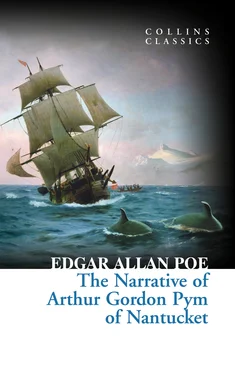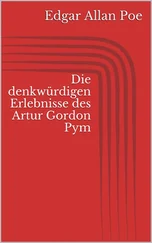I found myself, upon reviving, in the cabin of a large whaling-ship (the Penguin) bound to Nantucket. Several persons were standing over me, and Augustus, paler than death, was busily occupied in chafing my hands. Upon seeing me open my eyes, his exclamations of gratitude and joy excited alternate laughter and tears from the rough-looking personages who were present. The mystery of our being in existence was now soon explained. We had been run down by the whaling-ship, which was close-hauled, beating up to Nantucket with every sail she could venture to set, and consequently running almost at right angles to our own course. Several men were on the look-out forward, but did not perceive our boat until it was an impossibility to avoid coming in contact—their shouts of warning upon seeing us were what so terribly alarmed me. The huge ship, I was told, rode immediately over us with as much ease as our own little vessel would have passed over a feather, and without the least perceptible impediment to her progress. Not a scream arose from the deck of the victim—there was a slight grating sound to be heard mingling with the roar of wind and water, as the frail bark which was swallowed up rubbed for a moment along the keel of her destroyer—but this was all. Thinking our boat (which it will be remembered was dismasted) some mere shell cut adrift as useless, the captain (Captain E. T. V. Block, of New London) was for proceeding on his course without troubling himself further about the matter. Luckily, there were two of the look-out who swore positively to having seen some person at our helm, and represented the possibility of yet saving him. A discussion ensued, when Block grew angry, and, after a while, said that “it was no business of his to be eternally watching for egg-shells; that the ship should not put about for any such nonsense; and if there was a man run down, it was nobody’s fault but his own, he might drown and be dammed” or some language to that effect. Henderson, the first mate, now took the matter up, being justly indignant, as well as the whole ship’s crew, at a speech evincing so base a degree of heartless atrocity. He spoke plainly, seeing himself upheld by the men, told the captain he considered him a fit subject for the gallows, and that he would disobey his orders if he were hanged for it the moment he set his foot on shore. He strode aft, jostling Block (who turned pale and made no answer) on one side, and seizing the helm, gave the word, in a firm voice, Hard-a-lee! The men flew to their posts, and the ship went cleverly about. All this had occupied nearly five minutes, and it was supposed to be hardly within the bounds of possibility that any individual could be saved—allowing any to have been on board the boat. Yet, as the reader has seen, both Augustus and myself were rescued; and our deliverance seemed to have been brought about by two of those almost inconceivable pieces of good fortune which are attributed by the wise and pious to the special interference of Providence.
While the ship was yet in stays, the mate lowered the jolly-boat and jumped into her with the very two men, I believe, who spoke up as having seen me at the helm. They had just left the lee of the vessel (the moon still shining brightly) when she made a long and heavy roll to windward, and Henderson, at the same moment, starting up in his seat bawled out to his crew to back water . He would say nothing else—repeating his cry impatiently, back water! back water! The men put back as speedily as possible, but by this time the ship had gone round, and gotten fully under headway, although all hands on board were making great exertions to take in sail. In despite of the danger of the attempt, the mate clung to the main-chains as soon as they came within his reach. Another huge lurch now brought the starboard side of the vessel out of water nearly as far as her keel, when the cause of his anxiety was rendered obvious enough. The body of a man was seen to be affixed in the most singular manner to the smooth and shining bottom (the Penguin was coppered and copper-fastened), and beating violently against it with every movement of the hull. After several ineffectual efforts, made during the lurches of the ship, and at the imminent risk of swamping the boat I was finally disengaged from my perilous situation and taken on board—for the body proved to be my own. It appeared that one of the timber-bolts having started and broken a passage through the copper, it had arrested my progress as I passed under the ship, and fastened me in so extraordinary a manner to her bottom. The head of the bolt had made its way through the collar of the green baize jacket I had on, and through the back part of my neck, forcing itself out between two sinews and just below the right ear. I was immediately put to bed—although life seemed to be totally extinct. There was no surgeon on board. The captain, however, treated me with every attention—to make amends, I presume, in the eyes of his crew, for his atrocious behaviour in the previous portion of the adventure.
In the meantime, Henderson had again put off from the ship, although the wind was now blowing almost a hurricane. He had not been gone many minutes when he fell in with some fragments of our boat, and shortly afterward one of the men with him asserted that he could distinguish a cry for help at intervals amid the roaring of the tempest. This induced the hardy seamen to persevere in their search for more than half an hour, although repeated signals to return were made them by Captain Block, and although every moment on the water in so frail a boat was fraught to them with the most imminent and deadly peril. Indeed, it is nearly impossible to conceive how the small jolly they were in could have escaped destruction for a single instant. She was built, however, for the whaling service, and was fitted, as I have since had reason to believe, with air-boxes, in the manner of some life-boats used on the coast of Wales.
After searching in vain for about the period of time just mentioned, it was determined to get back to the ship. They had scarcely made this resolve when a feeble cry arose from a dark object that floated rapidly by. They pursued and soon overtook it. It proved to be the entire deck of the Ariel’s cuddy. Augustus was struggling near it, apparently in the last agonies. Upon getting hold of him it was found that he was attached by a rope to the floating timber. This rope, it will be remembered, I had myself tied around his waist, and made fast to a ringbolt, for the purpose of keeping him in an upright position, and my so doing, it appeared, had been ultimately the means of preserving his life. The Ariel was slightly put together, and in going down her frame naturally went to pieces; the deck of the cuddy, as might have been expected, was lifted, by the force of the water rushing in, entirely from the main timbers, and floated (with other fragments, no doubt) to the surface—Augustus was buoyed up with it, and thus escaped a terrible death.
It was more than an hour after being taken on board the Penguin before he could give any account of himself, or be made to comprehend the nature of the accident which had befallen our boat. At length he became thoroughly aroused, and spoke much of his sensations while in the water. Upon his first attaining any degree of consciousness, he found himself beneath the surface, whirling round and round with inconceivable rapidity, and with a rope wrapped in three or four folds tightly about his neck. In an instant afterward he felt himself going rapidly upward, when, his head striking violently against a hard substance, he again relapsed into insensibility. Upon once more reviving he was in fuller possession of his reason—this was still, however, in the greatest degree clouded and confused. He now knew that some accident had occurred, and that he was in the water, although his mouth was above the surface, and he could breathe with some freedom. Possibly, at this period the deck was drifting rapidly before the wind, and drawing him after it, as he floated upon his back. Of course, as long as he could have retained this position, it would have been nearly impossible that he should be drowned. Presently a surge threw him directly athwart the deck, and this post he endeavored to maintain, screaming at intervals for help. Just before he was discovered by Mr. Henderson, he had been obliged to relax his hold through exhaustion, and, falling into the sea, had given himself up for lost. During the whole period of his struggles he had not the faintest recollection of the Ariel, nor of the matters in connexion with the source of his disaster. A vague feeling of terror and despair had taken entire possession of his faculties. When he was finally picked up, every power of his mind had failed him; and, as before said, it was nearly an hour after getting on board the Penguin before he became fully aware of his condition. In regard to myself—I was resuscitated from a state bordering very nearly upon death (and after every other means had been tried in vain for three hours and a half) by vigorous friction with flannels bathed in hot oil—a proceeding suggested by Augustus. The wound in my neck, although of an ugly appearance, proved of little real consequence, and I soon recovered from its effects.
Читать дальше





